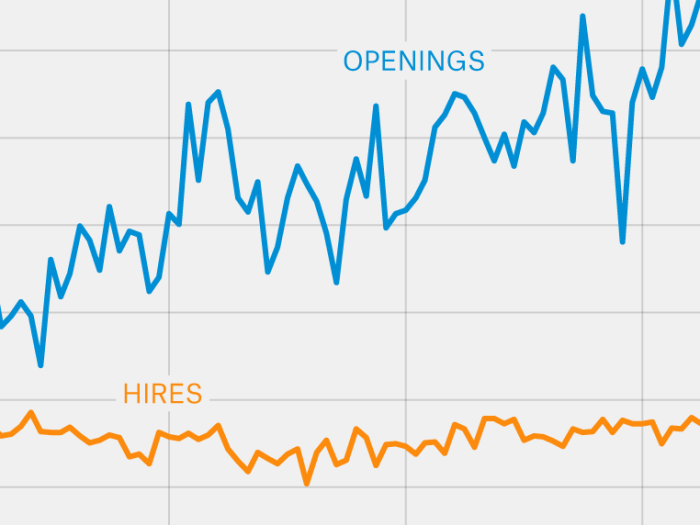
Job openings reached a record level of 8.1 million in March, yet 9.7 million still remain unemployed, showing a hiring gap between job openings and workers willing to accept those positions. Employers want to hire, but people are reluctant to go into available jobs due to expanded unemployment benefits, fear of contracting COVID-19, and a lack of childcare. Parents of young children are reluctant to work full-time jobs while their children remain at home, rather than attend an in-person school.
The largest job openings have been in blue collar jobs such as production, manufacturing, loading, and stocking. Many unemployed may not have the desire or the skills to work in these jobs. White-collar has yet to catch up. One of the largest increases has been in food service. The average wage in that sector in March was $16.63 an hour, which is around the same as what people receive for unemployment. Workers are further disincentivized because many start jobs paying far less than they could receive staying home and collecting unemployment benefits.
Both the benefits and the partially remote schools should be temporary. Some unemployment benefits expire in September, and most students are expected to attend school in person in the fall.
Stipulations to Unemployment Benefits
Biden said that Americans on unemployment must take a job if offered a “suitable” one or lose their benefits, in response to Republican criticism. Republicans have argued that unemployment benefits are too generous and cause workers to stay home, rather than rejoin the workforce. The White House said it is directing the Department of Labor to work with states to reimpose work search requirements for Americans collecting unemployment benefits. The Labor Department will soon issue a letter to “reaffirm” the rules of unemployment to ensure that workers, employers, and states understand the rules of the program. However, the White House did not announce a departure from prior policy on unemployment benefits.
There are also state-led efforts to get people back to work. States reinstating the work-search requirement include Arizona, Maine, New Hampshire, North Carolina, Pennsylvania, Rhode Island, and South Carolina. Montana, South Carolina, Alabama, and Arkansas are planning to stop the additional $300 benefit.
Inflation
Stimulus packages and other economic policies under the Biden Administration have also caused a significant amount of inflation. This has been noted by a surge in consumer prices. Consumer prices have gone up 4.2%, the sharpest jump since 2008. Energy prices have increased 25% from a year ago. Used car and truck prices have gone up by 21%. Lumber prices have also risen 124% amid persistent demand for building materials. Housing prices have also gone up, increasing property tax on many Americans. Copper has also gone up nearly 36%.

Biden has called for higher corporate and income taxes of anyone making $400,000 and above. This may pay off a higher level of government spending but not necessarily lead to reinvestment in the economy.
Not Booming Again
Biden has done little to improve the economy as a whole, aside from giving stimulus checks to people. Biden has largely followed a wealth redistribution program. Many sectors of the economy are still struggling. The service industry has been the first to start picking back up. The April jobs report from the Bureau of Labor Statistics show that the total nonfarming sector of the economy has taken a hit, and jobs have not rebounded to pre-pandemic levels yet. The most notable dips are in manufacturing, wholesale trade, and information.
Domestic manufacturing has decreased since the pandemic. Factories have been seen as crowded, unsafe places that could spread disease, and many states still have tough restrictions, particularly in the Northeast and West Coast.
Oil and Gas
Biden has allied himself with the “Go Green” climate change cause, hurting oil and gas sectors of the economy. He halted oil and gas leases on federal lands and cancelled the Keystone XL Pipeline. He has also eliminated fossil fuel subsidiaries, reversed Trump’s rollback on methane regulations, and staffed the SEC to mandate ESG and climate disclosures. He has also sharpened environmental regulation as a whole, which can hinder job growth and expansion in many areas. These policies have also caused gas prices to increase at the pump while eliminating many high paid jobs.
Immigration
At the very time when Biden has tried to align himself with union workers, his soft stance on immigration has raised questions about the hiring of US workers. Republicans believe an influx of low-skilled workers and sanctuary cities will lower the pay for existing workers in the United States. Illegal labor could allow employers to hire workers for less than the federally mandated $15 per hour.
Written by: Miranda Smith

